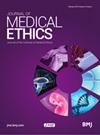On the elusiveness of higher-order risk attitudes.
IF 3.3
2区 哲学
Q1 ETHICS
引用次数: 1
Abstract
Makins formulates a deference principle which states that patients’ attitudes towards the health outcomes associated with different treatment options should drive decisionmaking and not physicians’ attitudes towards these health outcomes. Although this deference principle is widely agreed on, it is less obvious which role patients’ risk attitudes should play. Makins takes patients’ attitudes towards health outcomes to be sufficiently analogous to patients’ risk attitudes in order to extend his deference principle. His extended deference principle states that patients’ attitudes towards the health outcomes and risks associated with different treatment options should drive decisionmaking and not physicians’ attitudes towards these health outcomes and risks. This extension is not only taken to be ethically preferable, but also practically realisable as one can reliably trace patients’ (risk) attitudes. Problematic situations arise when patients exhibit risk attitudes they do not reflexively endorse. For instance, patients might systematically make more risky choices than they think they should make. In response to these kinds of situations, Makins proposes to revise his deference principle. His revised deference principle states that patients’ reflexively endorsed attitudes towards the health outcomes and risks associated with different treatment options should drive decisionmaking and not physicians’ reflexively endorsed attitudes towards these health outcomes and risks. That is, only the (risk) attitudes that are endorsed by patients’ higherorder (risk) attitudes should drive decisionmaking. This view is reminiscent of what are often called ‘Frankfurtian’ accounts of authenticity even if Frankfurt himself did not explicitly discuss authenticity. 3 Makins, however, does not discuss the literature that is critical towards these Frankfurtian accounts of authenticity while formulating his revised deference principle. The main theoretical problem Frankfurtian accounts of authenticity face is the following. Firstorder attitudes are authentic if and only if they are reflexively endorsed by secondorder attitudes. However, the question can be raised whether these secondorder attitudes need to be authentic as well. If secondorder attitudes need not be authentic, then what Christman (p7) calls the ‘ab initio problem’ arises. For if secondorder attitudes need not be endorsed by higherorder attitudes in order to be authentic, why does authenticity require firstorder attitudes to be endorsed by secondorder attitudes in the first place? If secondorder attitudes need to be authentic in order for them to be able to convey authenticity on firstorder attitudes, a regression looms. For the authenticity of secondorder attitudes can only be established by thirdorder attitudes, etc. Frankfurt 3 tried to stop this regression nonarbitrarily by stating that a decisive identification could end it. We do not need to decide here whether Frankfurt successfully avoided the regression as practical problems remain regardless of its success. For as Jesper Marceta points out, no reliable methods exist to empirically trace patients’ higherorder attitudes nor to establish whether patients’ firstorder attitudes are properly endorsed by these higherorder attitudes. So although it seemed possible to determine whether the conditions of the extended deference principle were fulfilled by tracing patients’ (risk) attitudes, it seems to be practically impossible to determine whether the conditions of the revised deference principle are fulfilled as one cannot reliably determine whether these (risk) attitudes have been endorsed by higherorder (risk) attitudes. In order to circumvent these problems, one might consider other accounts of authenticity. Marceta develops a taxonomy of accounts of authenticity that consists of three categories. The first are sanctionist—or Frankfurtian—accounts of authenticity. The second are coherentist accounts of authenticity. In order for an attitude to be authentic, a coherentist theory of authenticity would require that this attitude coheres with the other attitudes of that person. The third are originist accounts of authenticity. An attitude is authentic, according to originist accounts of authenticity, if it came about under appropriate, for example, nonconstraining circumstances. Although I cannot engage with the theoretical merits of each of these accounts of authenticity here, it seems to be sheer impossible, practically speaking, to operationalise any of them. For it is very difficult to determine which attitudes characterise a person, let alone to judge whether a particular attitude coheres with these attitudes. And it seems equally difficult to reconstruct the circumstances under which patients formed their attitudes and judge whether they substantially impaired the process of attitude formation. To conclude, although I agree with Makins that his deference principle should be extended to include patients’ risk attitudes, his revised deference principle is literally of no use. For there seems to be no way to differentiate reliably between (risk) attitudes that have been endorsed by higherorder (risk) attitudes and those that have not. More generally, it seems to be practically impossible to operationalise any account of authenticity. By consequence, the revised deference principle cannot be saved by plugging in another account of authenticity. Therefore, Makins might have to bite the bullet and accept that every now and then a patient’s seemingly inauthentic (risk) attitudes will drive decisionmaking.关于高阶风险态度的难以捉摸。
本文章由计算机程序翻译,如有差异,请以英文原文为准。
求助全文
约1分钟内获得全文
求助全文
来源期刊

Journal of Medical Ethics
医学-医学:伦理
CiteScore
7.80
自引率
9.80%
发文量
164
审稿时长
4-8 weeks
期刊介绍:
Journal of Medical Ethics is a leading international journal that reflects the whole field of medical ethics. The journal seeks to promote ethical reflection and conduct in scientific research and medical practice. It features articles on various ethical aspects of health care relevant to health care professionals, members of clinical ethics committees, medical ethics professionals, researchers and bioscientists, policy makers and patients.
Subscribers to the Journal of Medical Ethics also receive Medical Humanities journal at no extra cost.
JME is the official journal of the Institute of Medical Ethics.
 求助内容:
求助内容: 应助结果提醒方式:
应助结果提醒方式:


